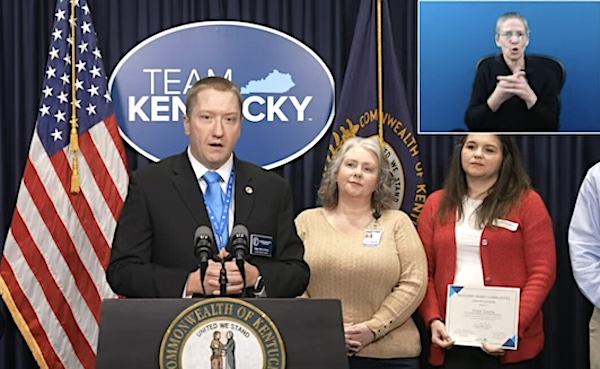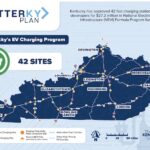Gov. Beshear Announces Floyd, Knott, Lawrence Counties Certified as Recovery Ready Communities
Building a new Kentucky home by saving lives from addiction
FRANKFORT, Ky. (Dec. 19, 2024) – Gov. Andy Beshear announced today that Floyd, Knott and Lawrence counties are now certified as Recovery Ready Communities, bringing the total number of certified counties to 21. Counties are recognized for having established services for residents who are seeking help for drug or alcohol addiction in three different categories – prevention, treatment and recovery support.
“I’m grateful to community leaders in Floyd, Knott and Lawrence counties for helping us make our new Kentucky home a place where people can find the hope and support they need to overcome addiction. Your efforts are truly saving lives,” said Gov. Beshear. “If you are ready to start your recovery journey, Team Kentucky is here to support you every step of the way.”
This announcement follows the Governor’s recent news that Kentucky saw a 9.8% decrease in drug overdose deaths in 2023, the commonwealth’s second consecutive annual decrease.
“Today’s three newly certified counties, Floyd, Knott and Lawrence counties, are to be commended for their focus on helping our most vulnerable population – our children,” said Pam Darnall, chair of the Recovery Ready Communities Advisory Council. “By ensuring that Kentucky’s youth have access to addiction treatment, peer support specialists, mental health treatment and second chance employment, we are creating a successful future for our next generation and saving future families from pain and loss.”
The certification of Floyd, Knott and Lawrence counties will allow Kentuckians to make positive changes in their lives while filling much-needed jobs and contributing to the commonwealth’s record-breaking economic growth.
Floyd County has been designated as a Recovery Ready Community and is ready to provide treatment services to roughly 34,423 Kentuckians through their Mountain Comprehensive Care Center, which operates a Quick Response Team focused on harm reduction, education, mental health and addiction treatment for overdose victims and their families. The county also operates a youth drop-in addiction center for ages 16 to 25 as well as the community’s only youth emergency homeless shelter. Floyd County is building a new Kentucky home where addiction is no longer destroying families through its “Reverse the Cycle” program, which places peer support specialists inside the county’s emergency departments. Additionally, the Floyd County Court system has expanded to include District and Circuit Drug Treatment Court, Veterans’ Drug Treatment Court and Mental Health Court, as well as access to the Eastern Kentucky Concentrated Employment Program, which helps individuals in recovery obtain meaningful employment.
“The recognition of Floyd County as a Recovery Ready Community is a testament to the cooperation and commitment of criminal justice officials and community partners to make Floyd County a better place to live and work,” said District Court Judge Tyler Green.
“By achieving a Recovery Ready Community certification, Floyd County signals its commitment to support those with substance use disorders holistically, improving lives and fostering a healthier, more supportive environment,” said Floyd County Public Health Director Martha Ellis. “Recovery Ready Certification ensures that systems are in place in Floyd County to reduce relapse rates, reduce overdose rates and promote mental health support all while promoting improved public health outcomes, community awareness and enhancing economic benefits.”
Knott County has been certified for its multiple prevention efforts focused on assisting high-risk individuals, families and neighborhoods. The county, which services more than 13,000 Kentuckians, operates a drop-in youth addiction center for ages 14 to 25, connects patients through the hospital system with addiction treatment prior to discharge and operates a full-service harm reduction outreach program, . Beacons of Hope, a rehabilitation center in Hazard, is also present in the county, providing both residential and outpatient addiction recovery services to the people of Knott County.
“Knott County’s journey to becoming a Recovery Ready Community is a testament to the resilience, strength and unity of its people,” said Greg Burke, executive director of Beacons of Hope. “Together, we are breaking the chains of addiction, building bridges of hope and ensuring that every individual has the opportunity to heal, thrive and contribute to a brighter future for our community.”
Lawrence County, home to approximately 16,000 Kentuckians, is supporting the commonwealth’s thriving economy by helping those in recovery obtain second chance employment opportunities through Millard College’s “Work Ready’ pathways to high-paying trades, including welding. Addiction Recovery Care has also supported the local economy with multiple fair chance employment training opportunities. In addition to employment, the county operates the federally funded Transition Age Youth Launching Realized Dreams initiative, which provides addiction treatment and support services to youth ages 16 to 25. The county’s certified community behavioral health clinic also provides residents with access to 24/7 behavioral health crisis services, enhanced interventions for dual-diagnosis patients and detoxification services.
“The Recovery Ready Certification is a transformative step for the city of Louisa and Lawrence County. It reflects our community’s unwavering commitment to supporting individuals and families affected by substance use disorder,” Louisa Mayor Harold Slone said. “This achievement is not just a recognition – it’s a call to action to continue fostering hope, recovery and opportunity for everyone. Together, we are building a stronger, healthier future.”
To learn more and to apply for certification as a Recovery Ready Community, click here.
The Governor has continued to fight the state’s drug epidemic since his time as attorney general, when he led the nation in the number of individual opioid lawsuits filed by an attorney general. Now, Gov. Beshear is working to make sure the hundreds of millions of dollars in settlement funds go to support treatment and the communities impacted.
Kentucky leads the nation in the number of residential drug and alcohol treatment beds per capita, and in 2023, the state supported the distribution of more than 160,000 doses of Narcan. The state’s Treatment Access Program also allows those without health insurance to enter residential treatment. And last year, Gov. Beshear announced a new searchable website to help people in recovery find housing, FindRecoveryHousingNowKY.org.
The administration has also recorded the three lowest recidivism rates in over a decade. This year, Gov. Beshear announced a new website to support Kentuckians seeking second chances find a job, get an education or continue recovery. The site also connects business leaders with resources to help them hire second-chance talent.
Treatment Resources
If you or a loved one are struggling with addiction, the KY HELP Call Center can connect you to treatment by calling 833-8KY-HELP (833-859-4357).
Information about treatment programs all across the commonwealth is available at FindHelpNowKy.org. Information on how to obtain the life-saving drug naloxone, which is used to reverse an opioid overdose, can be found at that website as well as at FindNaloxoneNowKy.org and FindMentalHealthNowKy.org.
Visit the Kentucky State Police website to find one of KSP’s 16 posts where those suffering from addiction can be paired with a local officer who will assist with locating an appropriate treatment program. The Angel Initiative is completely voluntary, and individuals will not be arrested or charged with any violations if they agree to participate in treatment.




















